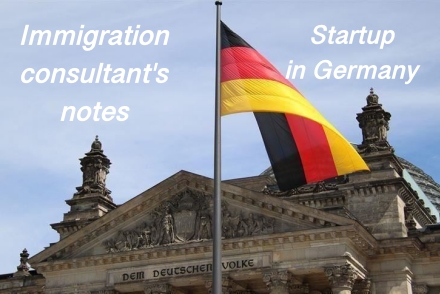Immigration consultant's notes. Startup in Germany.
Germany is one of Europe’s leading startup countries, attracting around 4.5 bn euro in venture capital funding in 2019, nearly double four years ago. Germany is on the top of Startup friendly countries 2020 second only to Japan. The majority Startup project owners would be ready to relocate to Germany since right here they expect to find the best environment for their brainchilds.
But persons from the third countries seeking to start a business in Germany as an entrepreneur or self-employed persons must obtain residence permit. For this the following conditions have to be secured:
- there needs to be an economic interest in, or a regional demand for product or service,
- it is foreseeable that applicant's company will have a positive effect on the economy,
- applicant are able to finance the implementation of his business concept with his own capital or through a loan commitment,
- if applicant is older than 45 years of age, residence permit can only be issued if applicant provide proof of adequate old age pension provisions.
And the key point for making a decision is a business plan. On the whole the business plan should include detailed information concerning:
- the business (e.g. its legal form and field of activity),
- the applicant's data (professional experience, possible academic training),
- details of business financing.
The business plan should also address the following questions:
- will the business increase the market potential and sales opportunities of other German enterprises?
- will the enterprise produce sustainable products?
- will the enterprise supply the German market with foreign products or will it export German products?
- does the region where the business will be established suffer from undersupply regarding the products the business will offer?
It should be additionally noted that in order to meet the requirements for self-employment the managing directors of a corporation (e.g. GmbH, UG) must also hold the majority of the shares or at least equal shares as the other shareholder(s) in the corporation. The distribution of the shares must be documented in a suitable form (e.g. articles of association or list of shareholders).Annual net income around 25,000 euro must be generated for managing directors and other legal representatives of partnerships and corporations. The managing directors of a corporation can provide evidence of corresponding income in the form of a management contract.
In conclusion it's necessary to underline that in Germany, applications for residence permits are submitted to a local “offices for foreigners” (Ausländerbehörde or Ausländeramt), which are located throughout Germany. As a result, applicants are not dealing with central officials, but local authorities with their own local culture, preferences and ways of doing business. As a result, obtaining a German residence permit is much easier if one contacts the local office for foreigners before submitting an application. These contacts often are the crucial part of the application procedure.
But the offices for foreigners are not the only authority involved in making decisions. The foreigner’s office usually consults other agencies (the local Chamber of Commerce, the Chamber of Crafts or other professional organisations) to obtain their expert advice and conclusion. Thus, it is very important to discuss the proposed residence permit application with these institutions as well. Having these conversations prior to submission increases the chances for approval.
Self-employed persons with a viable business plan do not have to prove any knowledge of the German language and do not need to present certain professional qualifications. Moreover, there is no minimum amount for investments. As well as this a residence permit comes with the perspective of permanently settled status in Germany. The self-employed person can obtain a settlement permit after just three years and German citizenship after just six years under certain conditions. In addition, spouses and minor children acquire the right to family reunification.






